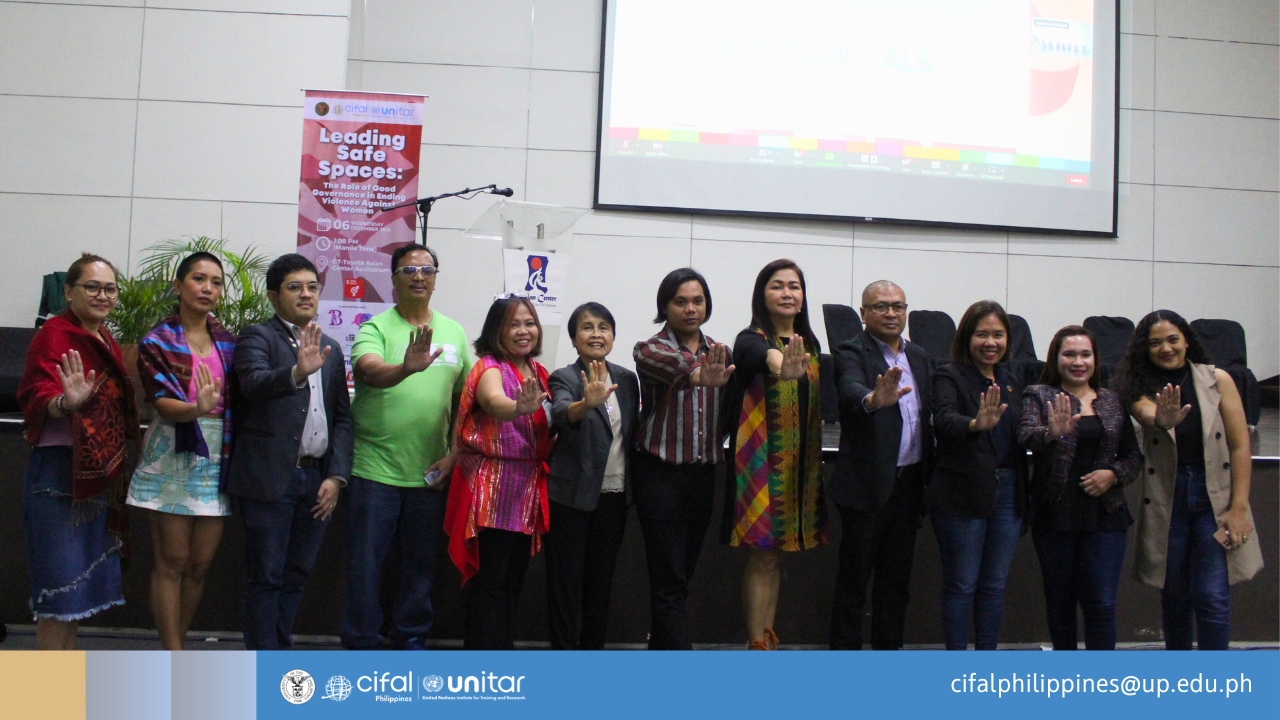6 December 2023—UP-CIFAL Philippines held a compelling forum entitled focused on the role of good governance in creating safe spaces and eradicating gender-based violence (GBV) in the Philippines. Alongside the forum, a fair featuring organizations championing women’s rights, such as Lunas Collective, Sagip Babae Foundation, and Sanggunian: Commission on Anti-Sexual Misconduct and Violence, was showcased at the event.

The forum and fair were held in support of the 18-Day Campaign to End Violence Against Women (VAW) and was conducted in partnership with Bayi, Inc., FEU Department of International Studies, Lunas Collective, Manila Bulletin, The Adamson Chronicle, Tanglaw, The Catalyst, The Manila Collegian, UP Asian Center, and UP Center for Women’s and Gender Studies.
Ms. Ma. Rosalyn Mesina, Country Programme Coordinator of United Nations (UN) Women Philippines, opened the forum through a written message by underscoring the importance of allocating serious resources to foster a safe environment for women. Moreover, she also stressed the significance of involving women’s rights organizations in crafting efficient gender-responsive policies.
The main program was divided into two parts: a two-part talk providing an overview of the status of GBV in the Philippines as well as the laws and policies in the Philippines geared towards ending VAW and a panel discussion focusing on the role of good governance in eliminating VAW and GBV.

Ms. Himaya Tamayo, Executive Director of Bayi, Inc., provided details on the status quo of GBV in the country. She noted that in the Philippines alone, 1 out of 4 Filipino women aged from 18 to 29 experience violence inflicted by their husbands or partners, and these numbers bloated during the pandemic. Additionally, she stated that due to technically-driven violence, there is an upsurge in online harassment and non-consensual talking against women and girls. Furthermore, Ms. Tamayo highlighted violence against women is intersectional therefore there must be inclusive action from authorities and systems.

Moreover, Ms. Sandra Montano, consultant of the Quezon City Protection Center for Victims of Gender-based Violence and Abuse, discussed nine policies and programs geared toward ending VAW and GBV in the Philippines. She further defined the different forms of VAWC, ranging from physical and sexual, which were the most common, to psychological and economic.

Following the talks, a panel discussion tackling the role of good governance in ending violence against women took place.
Chairperson Emmi De Jesus of the Gabriela Women’s Party, speaking from her experience as the former representative, mentioned that the use of political, economic, and cultural factors impede equal attitudes toward women as their issues are often trivialized and joked about in terms of governance. Given this, she stressed that the solution must be radical—a people’s movement coupled with responsibility and accountability.
Prof. Teresa Paula de Luna, Coordinator of the University of the Philippines Diliman Office of Anti-Sexual Harassment, identified the biggest challenge their office faces in terms of being front liners in GBV cases, which is the lack of language of consent and non-consent. She further affirmed that consent is temporal, and this can be withdrawn at any time. She also discussed the culture of victim blaming during VAW reporting, citing that survivors tend to remain silent because most authorities, instead of helping them attain justice, accuse what they wear, the way they present, and act as reasons behind the crime they experienced.
Moreover, Asst. Professor Sabrina Laya Gacad, Founder and Executive Director of Lunas Collective, shared that through the years, the improvement of legislation is seen depending on the ability of society to explain to people in power that violence and harm have different forms. She further emphasized that in the Safe Spaces Act, it was contextualized that violence will be determined by whether or not a specific person felt harmed. She also shared that her aversion to defining consent in the law stems from its inability to accommodate the changing dynamics of consent, safe spaces, and norms of masculinity and femininity that we continue to break.
Ricky Bunao, Executive Vice Chairperson of Men Opposed to Violence Against Women Everywhere (MOVE) Philippines, pointed out the Philippines’ patriarchal society makes women and children vulnerable to violence. He also alluded to the importance of implementing our advocacies to incite real change within our society.
Meanwhile, Michael Pastor, consultant of MOVE Philippines, delved into the importance of integrating GBV awareness in schools, especially catered to young men and boys to cultivate a culture free from GBV. He also critiqued the norm of victim-blaming in the country, citing that engaging in it fosters an environment of accountability avoidance.
He also shared that there is a stark difference between the policies at the community and national level that results in unreported VAW and GBV cases. He suggested that the government should be consistent in compiling the data to create full-fledged evidence-based policies.

Prof. Aurora Javate, Senior Project Director of Miriam College Women and Gender Institute, provided the synthesis for the forum, emphasizing that while we are near eradicating VAW, we are currently taking significant steps to reach this goal. She also underscored that both men and women should work together to create environments for inclusive transformation.
Dean Henelito Sevilla Jr. of the UP Asian Center commended UP-CIFAL Philippines for organizing a forum and fair that provided a platform to forward women-centered advocacies as different sectors work together to create a society free from GBV.
The program was formally concluded by Dr. Michelle Palumbarit, Director of UP-CIFAL Philippines, assuring that as gender equality is one of the thrusts of UP-CIFAL Philippines, the center will always support and promote causes forwarding women and children’s rights.
The forum and fair ignited important conversations on the current situation of VAW and GBV in the Philippines as well as the essential role of good governance in legislating effective and gender-responsive policies.
For more information about the event and its outcomes, please contact:
Andreana Gabrielle David (Ms.)
Communications Officer
UP-CIFAL Philippines
Email: [email protected]
[email protected]

![[RIGHT]unitar_logo](https://cifal.up.edu.ph/wp-content/uploads/2024/01/RIGHTunitar_logo.png)
